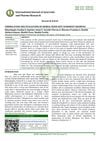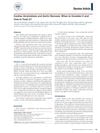 August 2024 in “International Journal of Basic & Clinical Pharmacology”
August 2024 in “International Journal of Basic & Clinical Pharmacology” Secretome-based therapies could improve hair growth better than current treatments.

Hair analysis can help identify specific minerals and amino acids linked to various diseases.
[object Object]  April 2024 in “Frontiers in medicine”
April 2024 in “Frontiers in medicine” Alopecia Areata significantly lowers quality of life and current treatments are inadequate, highlighting a need for better therapies and standardized treatment protocols.

Hair product allergies are common, especially to hair dyes, and hairdressers are at higher risk.
 March 2024 in “Frontiers in genetics”
March 2024 in “Frontiers in genetics” Xiangdong black goats have moderate genetic diversity, minimal inbreeding, and important genes for reproduction, immunity, and other traits.
 February 2024 in “International neuropsychiatric disease journal”
February 2024 in “International neuropsychiatric disease journal” Alopecia areata severely impacts quality of life, mental health, and work productivity.
 February 2024 in “BioMetals”
February 2024 in “BioMetals” Heavy metals like arsenic, cadmium, and lead can increase cancer risk and worsen outcomes.
 January 2024 in “Journal of medical clinical case reports”
January 2024 in “Journal of medical clinical case reports” NX35growth™ effectively promotes hair growth and improves hair health.
 January 2024 in “bioRxiv (Cold Spring Harbor Laboratory)”
January 2024 in “bioRxiv (Cold Spring Harbor Laboratory)” A specific enzyme is essential for proper hair follicle stem cell development and healthy skin.
 January 2024 in “Wiadomości Lekarskie”
January 2024 in “Wiadomości Lekarskie” Robotic hair transplantation with AI offers more reliable, precise, and efficient hair restoration.
 December 2023 in “Health Information Jurnal Penelitian”
December 2023 in “Health Information Jurnal Penelitian” Post-COVID syndrome causes long-lasting symptoms like fatigue, breathing issues, and anxiety.
 December 2023 in “bioRxiv (Cold Spring Harbor Laboratory)”
December 2023 in “bioRxiv (Cold Spring Harbor Laboratory)” Different types of inactive melanocyte stem cells exist with unique characteristics and potential to develop into other cells.
 December 2023 in “Frontiers in microbiology”
December 2023 in “Frontiers in microbiology” Mannan oligosaccharides improve raccoon dogs' fur quality and overall health.
 December 2023 in “Biointerface Research in Applied Chemistry”
December 2023 in “Biointerface Research in Applied Chemistry” Stiripentol shows promise as a potential treatment for androgen-related diseases but needs more testing.
 November 2023 in “Jurnal Ilmu Kesehatan Hewan”
November 2023 in “Jurnal Ilmu Kesehatan Hewan” The dog's condition improved after 21 days of treatment.
[object Object]  November 2023 in “Klìtinna ta organna transplantologìâ”
November 2023 in “Klìtinna ta organna transplantologìâ” MSC-derived exosomes can help treat COVID-19, hair loss, skin aging, and arthritis.
 November 2023 in “bioRxiv (Cold Spring Harbor Laboratory)”
November 2023 in “bioRxiv (Cold Spring Harbor Laboratory)” Scientists made a mouse that shows how a specific protein in the skin changes and affects hair growth and shape.
 September 2023 in “bioRxiv (Cold Spring Harbor Laboratory)”
September 2023 in “bioRxiv (Cold Spring Harbor Laboratory)” The mTurq2-Col4a1 mouse model shows that cells can divide while attached to stable basement membranes during development.
 September 2023 in “International journal of medicine”
September 2023 in “International journal of medicine” AI is revolutionizing healthcare by improving diagnosis, treatment, and monitoring, but still needs close supervision.

Baricitinib is a new, effective treatment for advanced alopecia areata but is costly and has risks.
 January 2023 in “Research Square (Research Square)”
January 2023 in “Research Square (Research Square)” Hair cortisol may be a good indicator of recent mood in people with bipolar disorder.
 January 2023 in “International journal of Ayurveda and pharma research”
January 2023 in “International journal of Ayurveda and pharma research” The herbal shampoo is effective and safe for use.
 January 2023 in “Mastology”
January 2023 in “Mastology” Hormone therapy for breast cancer often leads to sexual issues like vaginal dryness and decreased libido.
 January 2023 in “Tehnika”
January 2023 in “Tehnika” Biomedical engineers are crucial for developing better treatments for chronic and autoimmune diseases.
 May 2022 in “Gastroenterology”
May 2022 in “Gastroenterology” Targeting NETs may help reduce fibrosis in Crohn's disease.

Isotretinoin may cause temporary, reversible facial hair growth in some women.

Lamivudine might reverse hair graying and needs more research for potential treatments.
 January 2021 in “ABC Heart Failure & Cardiomyopathy”
January 2021 in “ABC Heart Failure & Cardiomyopathy” When treating older patients with both heart valve disease and heart muscle disease, doctors should create personalized treatment plans that address both conditions.
 September 2020 in “Research Square (Research Square)”
September 2020 in “Research Square (Research Square)” Certain genes influence immunoglobulin levels in Chinese Holstein cows, which can improve calf health.
 July 2020 in “Research Square (Research Square)”
July 2020 in “Research Square (Research Square)” Selective breeding can enhance immunity in dairy cattle.






























